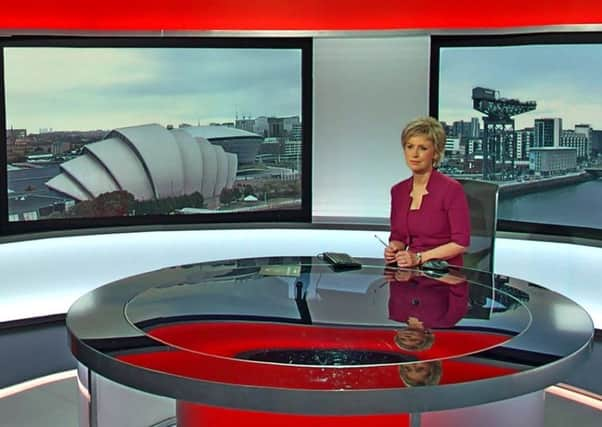Dani Garavelli: Show some ambition and back the Scottish Six


In 1998, between the vote for devolution and the opening of the Scottish Parliament, the idea of an hour-long 6pm news bulletin produced in Queen Margaret Drive in Glasgow was supported by 60 per cent of the population, the then BBC controller John McCormick, all 12 members of the Broadcasting Council for Scotland (BCS) and several newspapers. A majority of viewers were tired of London’s inability to grasp what mattered to them and of the word-for-word duplication of stories on the 6 o’clock news and Reporting Scotland. I was covering the story for Scotland on Sunday and remember the anger expressed when it emerged that, despite intense lobbying, the BBC governors had rejected the proposal. It soon emerged they had come under pressure from Tony Blair and cabinet colleagues who viewed a Scotland-produced bulletin as a totem for the SNP. Scottish Six campaigner and devolution expert Professor Lindsay Paterson immediately resigned from the BCS, claiming the governors had “patronised and trivialised” the debate. “At one stage, one of them asked me what it was about the [6pm] news that got up Scottish people’s nose. It was as if it was just a question of providing a check-list rather than a debate about democracy and an entire cultural heritage,” he told me later.
Contrast this level of passion with the seeping negativity generated by last week’s announcement that the BBC was to begin trialling a Scottish Six. On the part of ultra-unionists, there was contempt. If they weren’t accusing the corporation of buckling under pressure from Fiona Hyslop (a conspiracy theory to rival the cybernats’ wildest, given this has been talked about for almost 20 years) they were forecasting a diet of crime and fitba’, with a side-order of speeches from “the Dear Leader”.
Advertisement
Hide AdAdvertisement
Hide AdYou might have expected the pro-independence lobby to be more enthusiastic (if only to noise up their opponents). But here too there has been sniping from those who regard the BBC as a propaganda machine that robbed them of victory. How can the dolts at Pacific Quay be trusted to deliver? And if that sounds like a variation on the Unionist theme, well: go figure.
So on both sides: the nursing of grievances, the grinding of axes. The rest of the population, meanwhile, seems apathetic. Some surveys have suggested those who back a Scottish Six are in the minority and the support in focus groups was said to be muted. Perhaps people are content listening to extended reports on a junior doctors’ strike that doesn’t affect them. Or perhaps they’re so used to being treated as second-class citizens, they’ve stopped noticing.
Given the context in which this debate is taking place, opposition to a Scottish Six seems short-sighted. The country’s newspapers are dying on their feet. The industry is haemorrhaging jobs and expertise, stories are going untold, scandals un-investigated. You’d think any proposal that might lead to more investment, greater resources, and a more vibrant home-grown media would be met with an open mind.
For Yes voters, an integrated Scotland-produced news bulletin offers an opportunity to reinforce the idea of nationhood, for unionists, potentially, a greater scrutiny of government policy. Imagine a programme in which the presenter/reporters did not spend ten minutes talking about England’s teacher brain-drain or the A-Level results, but could focus instead on the pros and cons of the Curriculum for Excellence or attempts to narrow the attainment gap.
It seems to me that those who can’t conceive of a Scottish Six that is not insular or navel-gazing are either bereft of imagination or – more likely – blinded by their own prejudices. Alan Cochrane sneers at the concept of news through a Scottish lens, as if it is difficult to understand why a country that needs more migrants is not well-served by a narrative that presents them as a burden on over-stretched services. Others fret about the loss of UK and international focus in the apparent belief that those producing a Scottish bulletin might forget to cover Donald Trump’s bid to become the US Republican presidential candidate or Boris Johnson’s decision to back Brexit.
I have limited experience of the internal workings of BBC Scotland, but over the past year I have occasionally been a guest on Radio Scotland’s Sunday edition of GMS. At 9am, guests review the papers then listen to a report and extended discussion on a particular issue before chipping in with their own views. Topics have included the Charlie Hebdo massacre, the child sex abuse inquiries, rituals in the House of Commons, the 25th anniversary of Thatcher’s resignation and China: perceptions and reality. On no occasion has the treatment been parochial, though Scottish-specific angles have been explored when appropriate.
My point is, it’s not hard to envisage a successful Scottish Six. As Allan Little has pointed out there are issues that need resolved, such as how non-BBC Scotland specialist journalists could service two separate news programmes being aired at similar times. But BBC Scotland has a healthy talent pool – Brian Taylor, Pauline McLean, Sarah Smith, Shelley Jofre to name but a few – and more would likely return home if fresh opportunities arose. It’s just a question of showing ambition and finding an effective format.
Instead of dismissing the idea, those who have concerns about the future should focus on securing the kind of Scottish Six the country deserves. Not a compromise which flits back and forth from Glasgow to London. Not an urban-centric programme that rarely strays from the central belt, but a properly resourced, professionally produced bulletin that reflects the country in all its economic, political and cultural glory. «